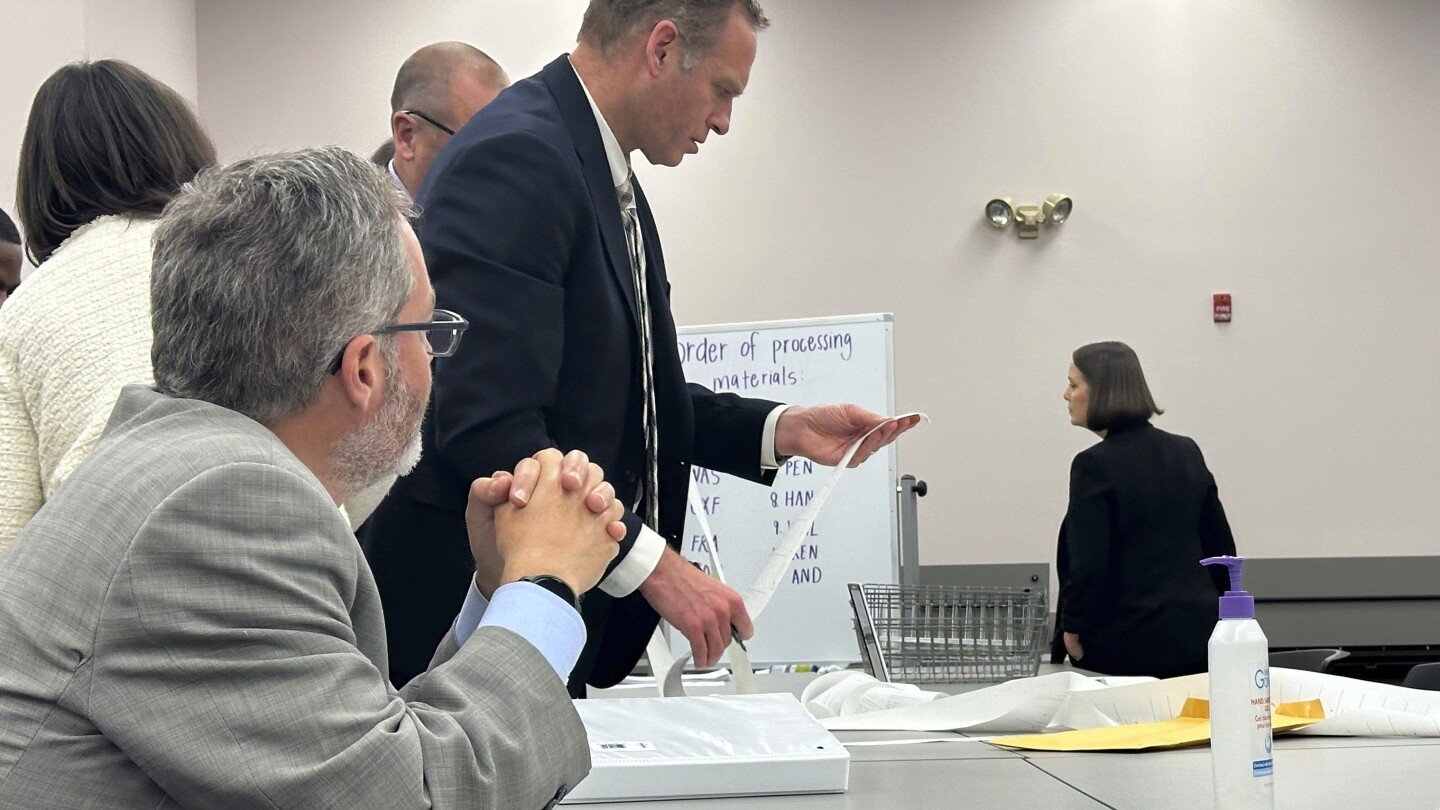Summary
Voters across eight states, including Arizona, Colorado, and Nevada, rejected ballot measures for election reforms such as ranked choice voting (RCV) and open primaries, despite a $110 million push from advocates.
The movement, inspired by Alaska’s 2020 adoption of these reforms, failed to gain traction, with critics citing confusion and doubts over RCV’s benefits.
Some reforms succeeded locally, including in Portland, Oregon, but opposition remains strong.
$100M push?
Peanuts.
Musk invested $145M just to win PA for trump.
Until we have billionaires pumping billions into improving our way of life, things will only get worse.
And billionaires are never going to pump billions into improving our way of life, because they’re all narcissistic sociopathic dragons who care only about continuing to enrich themselves further at the cost of our way of life.
Which means we’re in late stage capitalism. In history, that usually is also the end for the democracy of those governments.
The RCV proposition in Arizona was terrible.
It allowed lawmakers to change the number of candidates who advance to the Ranked Choice Voting stage every six years, which means they could literally force it down to two candidates anyway.
Even better, if lawmakers can’t agree on the number of advancing candidates by a deadline, the Secretary of State just gets to choose it by themselves with no oversight.
But we can only think of entertaining progressive policy once we have RCV in all 50 states!
“RCV is too confusing” say people who have no problem filling out sports brackets 🙄
Well, you just came up with a great way to sell it, since we are already basically treating politics like sports. Brackets for president!
I had this exact thought! It’s a simple comparison with a subtle nod to acceptance of the somewhat-more-likely-to-be-conservative blue collar crowd.
The progressives need better messaging on literally everything. I’m only into marketing as a side interest and some of the crap the Democrats put out is infuriatingly bad–especially considering it’s up against the fascist/corporatist propaganda machine.
Ignorance is bliss
Missouri got their anti-RCV proposal passed by billing it as an amendment declaring that non-citizens cannot vote. That’s right, they did it by banning something that was already against the law.
Maybe the way forward for election reform is to put it as a footnote in a proposition declaring murder to be bad.
The solution is to frame it in a way such that hateful idiots feel like they’re punishing someone else? That sounds about right.
“RCV is too confusing” say anti-RCV politicians deliberately wording RCV ballot measures to be as confusing as possible.
One thing the last few elections have made abundantly clear is just how fuckin dumb most Americans are.
Like … unimaginably so. I cannot fathom the level of ignorance experienced by so many people.
Disappointing. RCV is how we can try to break free of the two parties.
You can lead a horse to water, but you can’t make them drink.
Many people are too uninformed to understand why RCV benefits them. Others understand that it’s liable to upset the status quo that they like. Between ignorance and malice, it’s not surprising that RCV is a difficult sell.
In Arizona, the RCV proposition didn’t pass because it was bundled with open primaries. The bill was mainly about requiring open primaries with only a small mention of requiring ranked choice voting at the end. I would bet a lot of people here didn’t even know ranked choice voting was on their ballot.
I think it is more of a difficult sell because of all the political and financial opposition. Nobody outside the US considers systems with more than two parties complicated. Instead it is pretty straightforward. You vote a party and the party gets seats accordingly to how many people voted for it. It is easier than the whole swing-state electoral college bullshit. But looking at Baseball and Imperial units it seems Americans need things to be needlessly complicated.
On the financial front, in Alaska the RCV maintainers outspent the repealers 100:1, yet the bill to repeal vote barely failed by some 600 votes - triggering a recount.
Quite so. Same with the uniquely American obsession with acronyms. I swear to god, everything they touch gets one.
Tbf, that’s more online than irl. IMHO
Nah fam, I didn’t know how much of a thing it was until I went to the states. Every time there’s a subject to learn in school or some new policy, it must have an acronym, bonus points if it also features a flow chart guide for dummies.
Acronyms are fun. FUBAR being the best one.
In Montana it was separated into two confusing proposals. Ignoring the campaigning against it, as someone in support of RCV I had no idea that’s what they were talking about without looking it up.
There’s still a lot of education that needs to be done on these topics, it’s all still pretty niche among the broader public.
Totally agree. In 2000, during the hanging chad debacle, I had a philosophy professor completely shift our class to the philosophy of voting. I found it endlessly fascinating and opened my thinking around voting. Here’s some good info on the topic: https://plato.stanford.edu/entries/voting-methods/.
We should be pushing approval voting instead, the educational barrier is way lower and both RC and approval are a load better than FPTP.
This right here is why people get confused. Cause someone always pops up and says “no we should do this whole different method instead” and the waters get muddied.
I’m only saying this because the vote failed everywhere, clearly it’s a strategy problem.
If you ask anyone on the street if they would want more moderates and parties in office, a large majority would agree, so if that’s the goal, the question is, how do we get there. Ranked choice is great, but it’s not optimal in either how the tallying determines a winner, or in convincing people this is better. Approval voting is clearly easier to explain and probably convince people it’s better. So now that the vote has failed, we should reassess our strategy from ranked choice to approval voting.
both… are a load better than FPTP.
That’s exactly why we shouldn’t quibble over them too much.
In other words, now is a good time to make the argument you’re making. However, I also saw people making that sort of argument just before the election, after the decisions about what to put on the ballots had already been made, and in that context the argument come across as anti-RCV concern trolling.
I used to think RCV would make democracy much better. I now know that is not necessarily true.
I still think proportional representation does make democracy better. In a proportionally representative system, political parties are assigned seats in the legislature according to the percentage of votes they receive. So, if a party receives 30% of the votes, they get 30% of the seats. It’s true that this means that often no one party has a majority, requiring multiple parties to come together and form a majority coalition (and this can be a challenge - Germany has a few examples of this not working out, one recent and one very famous), but it works well enough in most democracies.
So what would be the threshold for Senator representation split? Obviously if a state is 50/50 it would be one of each. But when would they both go to one party? 67/33?
Also, how do they determine who is at the top of the ballot for each party? The primary?
As a resident in a red state that regularly votes more than 1/3 Democratic but has 100% Republican representation in congress, I would love to have some representation.
The Senate couldn’t exist, because it is inherently disproportionate. The Senate would have to be abolished and the house of representatives would have to be expanded and restructured.
The US is unique. We are the only democracy that is also a federation of semi-autonomous states, each with its own constitution and somewhat independent legislature. I believe in other democracies that don’t have semi-autonomous, semi-independent states, what they do is hold a national, parliamentary election in which people vote for parties, not necessarily individual candidates. Seats in parliament are then assigned to each party based on the percentage of the popular vote they receive. So, if a parliament has 100 total seats, and 25% of the people vote for a specific party, that party gets 25 seats.
The US federal house of representatives already assigns seats proportionally to each state based on population. I don’t know how it would need to be restructured so that there would also be proportional representation based on political affiliation. I would have to think about that.
Edit: I guess one way it could work is the federal house would give each state a certain number of seats based on the state’s population, and then each state’s block of seats would be divided among the parties based on the percentage of votes they get in that state. And then representatives could join up with representatives from other states that belong to their same party. I don’t know, I suppose that’s one option.
The US is weird. Most other democracies have a single, national government instead of separate state and federal governments. Also, most other democracies have MUCH smaller populations than the US.
In the Dutch parliamentary system we do have a two-house structure (i.e. we have a Parliament and a Senate), while also having proportional representation.
-
There is a national election every four years that determines the make-up of the national parliament. The result directly proportionally determines the seat division (150 seats total).
-
There is also a provincial election every four years. This directly proportionally determines the seat division of the respective provincial houses.
But it also indirectly determines the make-up of the Senate. The provincial houses hold their own election and vote for the seat division of the Senate (75 seats total for 12 provinces).
It is traditionally seen that Parliament proposes, argues and passes legislation, while the Senate checks the passed legislation for constitutionality before giving it their sign of approval.
Another view is that Parliament is the direct representation of the people, while the Senate is the national representation of the provincial houses.I think it is worth keeping in mind that an electoral system doesn’t have to be exactly like the theoretically pure version. You can mix and match elements to something that would suit your situation best (for instance in terms of achievability)
-
In Colorado, it was severely flawed, being a jungle election, then a RCV.
Well sure but these are the same mouth-breathing cloven-hooved dipshits that elected trump.
I think we should start pushing approval voting instead of ranked choice. Ranked choice is easy to explain how to vote but a little complex to explain how the vote is tallied and that’s what people find confusing.
Approval voting is straight forward and easy to explain, whoever gets the most approvals wins.
They both are much better than what we have.
California has rcv for senators I believe, and Adam schiff used it to advocate for the republican so that he wouldn’t have to run against Katie Porter in the actual race.
No republican will win a senate race in California, so by funding the republican campaign in the primary, he made it so he could lock in his win.
Wevhave jungle primaries, which means ya get the top two in the general. Newsome killed the RCV bill passed by the California Congress.
Ok interesting, seems similar to what Colorado was trying to pass















